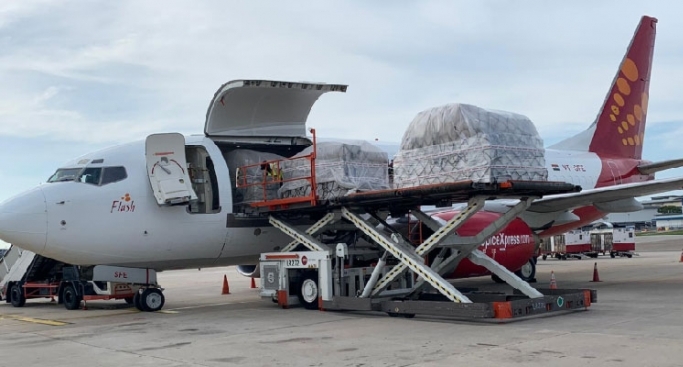Recovery for Indian air cargo from Covid-19 will be U-shaped and not V
April 21, 2020: As expressed in a recent virtual conference, the Indian air cargo industry stakeholders seem to believe that the recovery and normalization of the movement of freight through the air will not be V-shaped instead it will go for a U-shaped route and will take much more time as the domestic industry sectors are affected into its core.

April 21, 2020: As expressed in a recent virtual conference, the Indian air cargo industry stakeholders seem to believe that the recovery and normalization of the movement of freight through the air will not be V-shaped instead it will go for a U-shaped route and will take much more time as the domestic industry sectors are affected into its core. The industry was also been appreciative of each other stakeholder for coming together and helping each other during the crisis of Covid-19.
Keku Gazder, chief executive officer, AAICLAS logistics & services said “It will take at least three or four months to start the usual exports and then seven or eight months to get back into the usual business of air cargo. It will not be a V-shaped recovery. We will only see a U-shaped recovery as it will take time for many industries to restart their manufacturing and services.”
Vandana Aggarwal, economic advisor, ministry of civil aviation said “It is heartening to see how all stakeholders are coming together and solving each other’s problems and fighting against the pandemic together. Since the pandemic and the lockdown, we have exported pharmaceuticals to 108 countries till now and for example we put a global benchmark by giving clearance to a high valued dangerous goods in just seven minutes.”
They were speaking during a webinar on the topic ‘How India overcomes supply chain disruptions during Covid-19’ organized by Air Cargo India on April 21, 2020.
Transporting perishables and high freight rates
The high freight rates are clearly due to the reduced capacity, high demand for the movement of essential goods and also due to the dominant position that air cargo right now has in the supply chain. Meanwhile, the Indian government has come out with Krishi Udan scheme to help transport perishables and hopefully the freight rates will go down once the carriers introduce more capacity and when things will ease up.
Sanjiv Gupta, chief executive officer, SpiceXpress said “We have five freighters with four of them flying only in domestic routes. The Covid-19 changed the whole scenario. We have most of our freighters flying to China, South East Asia and the Middle East because we have seen demand for perishables to the Middle East, medicines and equipment from South East and China.
SpiceXpress is already transporting perishables inside the country with the help of Krishi Udan and Marine Krishi Udan schemes. For example we are still operating the freighters from Chennai to Surat and Kolkata to help shrimp cultivation.”
“We use freighters for bigger consignments, for perishables we mostly use main cabin passenger seats and to transport smaller cargoes to smaller tier III cities we use our bombardiers. We can also expect SpiceJet bombardiers with removed seats flying only for cargo in few months,” he added.
Demurrage charges at airports
On the demurrage charges and the sort of backlogs witnessed by airports, it has now seem to be a wise decision to give only 50 percent waiver and not to waive the whole as the airports would have been clogged with import cargo and dragging all air cargo terminals into a standstill.
Vijay Sharma, head cargo, Delhi International Airport said “In the first ten days of lockdown there was a huge backlog in all airports including the Delhi International Airport. This is when we came out with some innovative and proactive solutions. As the space for import cargo was full and the export near empty, with the help of Customs, we could use the export cargo space to store some of our import cargo and ensure the free movement of freight, especially the essential commodities to fight Covid-19. We also had to be proactive in working with freight forwarders, GSSAs and GHAs to encourage them to clear the back logs from airports. Now we don’t any backlogs and the cargoes are moving fine.”



